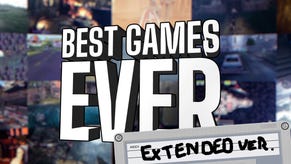No rest for the wicked: Ted Price on Insomniac's future
With three successive IP launches under its belt, Insomniac looks to be one of the surest bets for innovation in the industry. Nathan Grayson talks to CEO Ted Price about the shape of things to come.
It's weird to think about how tiny the gaming industry used to be. I mean, I still remember risking life, limb, and wedgie-swirly combo to pipe up about my affinity for Final Fantasy back in grade school. Back then, games were a niche. As gamers, we collectively had our own little treehouse with a paper sign that read, “No normal folks allowed.” Feeling like an outsider was rough, sure, but on some level we relished the ownership. Games were ours – and nobody else's.
Flash forward to today. Everybody plays games. Maybe it's your best friend who cracks “arrow to the knee” jokes until you want to crack them in the face. Maybe it's an old lady on the bus playing Words With Friends. Maybe it's half your friends on Facebook, who – pending their refusal to stop sending you Farmville/Cityville/Frontierville invites – won't be your friends for much longer. Point is, gaming arrived some time ago.
And that frightens you. Because, while you may not have had much in common with people around you as a kid, you had the attention of an entire industry. Now? Not so much. Slowly but surely, even your favorite game developers are defecting to the Social Side.
But is that really such a bad thing? Insomniac CEO Ted Price most certainly doesn't think so. With his company's social arm, Insomniac Click, ratcheting and clanking away on its first big mystery project, he couldn't be more excited. I caught up with him during SMU's Game::Business::Law Summit to discuss gaming's newfound mainstream acceptance and what that means for gamers like you and me.
VG247: So, why make the leap into multiplatform development after all this time? Are independent developers basically in an “evolve to survive” situation at this point?
Ted Price: A lot of us at Insomniac believe we need to reach a broader audience. Games of the future expect their experiences to be accessible anywhere. Being on multiple platforms is a step in that direction.
So is the age of the console-exclusive coming to a close?
It's certainly possible. I mean, I can't speak for first-party publishers. I believe that there are just more opportunities to get your IP out in front of a greater audience if you are on more platforms. So whether or not first-party exclusives continue is really up to those first-party publishers and whether or not they can find companies who are willing to restrict themselves to one platform.
However, if you look at the first-party publishers, it's no longer about one platform. Sony has multiple platforms: PSP, Vita, PS3. And Microsoft has Xbox 360, Windows, and Windows Phone. So it used to be that, if you were working with a first-party, you really were on one console. Period. But that's no longer the case either.
You just released Resistance 3, in which man fell and fell and fell until it stopped. But what about you? Is Insomniac stopping? Or at least giving Resistance a break?
We won't be making any more Resistances. (Note: Price later elaborated on that comment here.)
"There are social games I’ve found to be incredibly entertaining. One of my favorites is a fairly hardcore game in terms of its sensibilities."
You recently announced Insomniac Click, a social gaming initiative that's actually aiming to make these things, you know, fun. How, though? Coming from a triple-A background, how do you intend to attract folks like, say, me to social gaming?
I'm not gonna say anything about our social games, but I will say that there are social games I've found to be incredibly entertaining. I mean, one of my favorites is Backyard Monsters, which is a fairly hardcore game in terms of its sensibilities. It doesn't have a giant audience, but it has a dedicated audience. I found it incredibly compelling – as have a bunch of other folks at Insomniac.
Is it frightening to enter a landscape that's seemingly transformed into a minefield of lawsuits and copycatting? I mean, the whole Zynga/Tiny Tower thing can't be encouraging if you're hoping to make a splash doing something new.
Well, I don't think this industry has been free from lawsuits. There have been plenty. They just haven't made headlines as often as what we're seeing today. There are a lot more similarities between games in the social space, and everybody's jumping on what seems profitable at the time. There are trends that are popping up and flaring out very quickly. Everybody wants a piece of it, so you get a lot of plagiarism.
Do you think the vaunted social gamer vs hardcore gamer schism is as abyssal as people claim? Is it even a thing? Or are the audiences – in theory – one in the same?
As a gamer and someone who plays both social games and hardcore games, for me mentally, there's space for both. There are times when I do want to sit down and spend three hours or more with a game like Skyrim – which is really deep and compelling – and there are times when I want a five-minute experience where I can have fun, make progress, and look forward to coming back to it the next day.
And the same goes for mobile games. There's a lot of mobile apps right now that have that five-to-seven minute experience that manages to be both fulfilling and gives you an incentive to check in the next day. For instance, one of my favorites is Hero Academy. Hero Academy is awesome because it's wonderful asynchronous multiplayer. You spend about two-to-three minutes on your move, you submit it, and you come back later. And something cool has happened or you've been wiped out by the person you're playing against. But it's always interesting.
Yeah, it really seems like mobile games have begun to hit their stride lately. I mean, we've got titles like Hero Academy slowly snaking their way through social groups, and then there are mind-blowingly eye-popping hits like Infinity Blade leading the charge. Graphical fidelity and depth, especially, seem to have really come into their own. Do you think we'll soon see a similar evolution with social games?
"There’s risk in every corner of our industry, and the social space is probably evolving faster than just about any other part of the industry. So the risks are higher."
Yeah, I think that certainly over the next couple years, we're gonna see a huge evolution in the visuals in social games. It's thanks to improving technology. It's thanks to browsers that are getting better. It's thanks to development teams that are coming from the core, traditional gaming scene and moving into the social space.
Is it disheartening to see core publishers like, say, THQ having so much trouble transitioning into this new social-and-mobile-centric era?
I think that's a case in every [time of change]. I think there's risk in every corner of our industry, and the social space is probably evolving faster than just about any other part of the industry. So the risks are higher. In the social space, we and other people are still trying to figure out how to effectively market the games. Right now, there isn't any traditional marketing of Facebook games and social games. You're relying on word-of-mouth, you're relying on social networks to get the word out, and you're relying on the strength of your brand and the game itself to become a hit.
It's very different from, say, console games, where people spend a lot on marketing to break through the clutter. If you have a good game and you spend enough on marketing, you can.
And finally, for fun, Skylanders: Spyro's Adventures. Why bother with all this social and mobile nonsense when we've already discovered the real future of gaming?
We have it at home. My kids are really into it.
It's wild, right? I feel like Child Me's mind would have exploded at the mere thought of it.
I'm really happy for the franchise, because – when we walked away from it years ago – I was disheartened by the follow-ups to the games we had made. And now, to see it back with a fairly innovative concept is really rewarding for those of us who were on the first three Spyros.








.jpg?width=291&height=164&fit=crop&quality=80&format=jpg&auto=webp)
